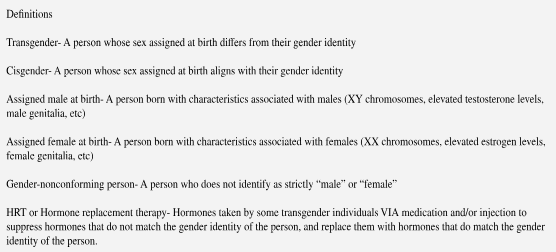
The relationship between America and the LGBTQ+ community has a long and complex history, with a variety of gains and losses in the pursuit of equal rights. In 2015, the Supreme Court of the United States of America ruled that same-sex marriage was legal in all 50 states, Disallowing all states denial of marriage certification based on the applicants being assigned the same sex at birth. However, despite this milestone, discrimination towards LGBTQ+ people remains in America.
In 2024, 661 total bills have been proposed regarding transgender individuals. These bills propose a variety of restrictions on the everyday lives of transgender individuals; attacking education, public restrooms, gender-affirming healthcare, civil rights, and sports, among other things.
These bills complicate everyday tasks such as using the public restroom that matches the gender of the user, self-identifying as a man, woman, or gender-nonconforming person on official documents, and finding literature with diverse characters in public school libraries.
However, arguably more importantly, these bills alienate transgender individuals.
Feelings of alienation and isolation, as well as bullying that transgender individuals often face, can result in dire consequences. According to the Trevor Project, a nonprofit organization focused on the prevention effort of suicide in the LGBTQ+ community, LGBTQ+ individuals are over four times more likely to attempt suicide when compared with their cisgender/heterosexual peers. Further studies by the Trevor project have shown approximately half of transgender and gender non-conforming individuals have attempted or considered attempting suicide. Bills that attack transgender rights are likely to increase these statistics even further.
In recent years, anti-transgender legislation has emphasized transgender people in sports. One example of this is bill NH HB1205 in New Hampshire. This bill states, “An interscholastic, intercollegiate, intramural, or club athletic team or sport sponsored by a school must be expressly designated as one of the following based on the biological sex at birth of the intended participants: (a) “Males”, “men”, or “boys”; (b) “Females”, “women”, or “girls”; or (c) “Coed” or “mixed”.”
In Layman’s terms, this bill would force all school-sponsored sports teams to be designated for only those who abide by their gender assigned at birth.
Other anti-transgender sports bills have been considered in 27 states, including Oklahoma (60 bills proposed), Missouri (44 bills proposed), and South Carolina (32 bills proposed). Additionally, over 40 bills have been proposed that, if passed, would be recognized on a national level.
For a demographic already facing so many mental health risks, this attack on transgender people in sports could yield devastating results, especially considering the mental health benefits experienced by athletes who play sports. Were bills such as NH HB 1205 to be passed, these benefits would be denied to transgender individuals.
“For me, (sports) were therapy. When you’re on the field, it takes so much concentration to play sports that you can’t think of anything else. (You) get away from your situation for a little while and then, when you get back to it after talking with people and communicating with people, you get to say ‘ok, I see you have some of the same issues as me. So how do you cope? How do you deal with it?’” said Coach Gordon, an athletic educator for over 30 years and coach who works at Decatur High School.
Along with both physical and mental health benefits, this marginalized community can find a safe space within sports. However, some question whether the acceptance of transgender women in women’s sports will destroy the safe space of many cisgender women. Because transgender women are assigned male at birth, some believe that they have an inherent advantage over cisgender women in the field of athletics.
“I don’t know, I’m still waiting on the research to see what the research says… I would think we are still kind of early in those stages… Suppose a transgender (athlete) competes against a male, and the transgender (athlete) beats the male- what does that mean? Or say the transgender (athlete) competes against a female, and the female wins- then what? To me, there’s not enough research out there to determine” said Gordon.
Though research is still relatively new, the National Center for Biotechnology Information (NCBI) indicates that transgender women who start hormone replacement therapy (HRT), have similar or the same estrogen levels as their cisgender female counterparts.
“There are many quantifiable performance-related differences between male and female athletes. In contrast, the performance-related differences between trans women who have received gender-affirming hormone treatment (GAHT) and cisgender women are less clear,” said The National Center for Biotechnology.
All this to say, thus far, it is quite possible that with further research, a way for transgender women to play sports without a physical advantage may be attainable.
Between all the benefits that playing sports may have on this at-risk community, combined with the research that shows transgender women may not necessarily have a physical advantage once transgender women have started HRT, there is no reason for this discrimination to continue.
Sports are a method of bringing people together: be it elementary school’s little league teams or gathering with friends & family to play football, transgender women deserve a place in this community, just like anybody else.







